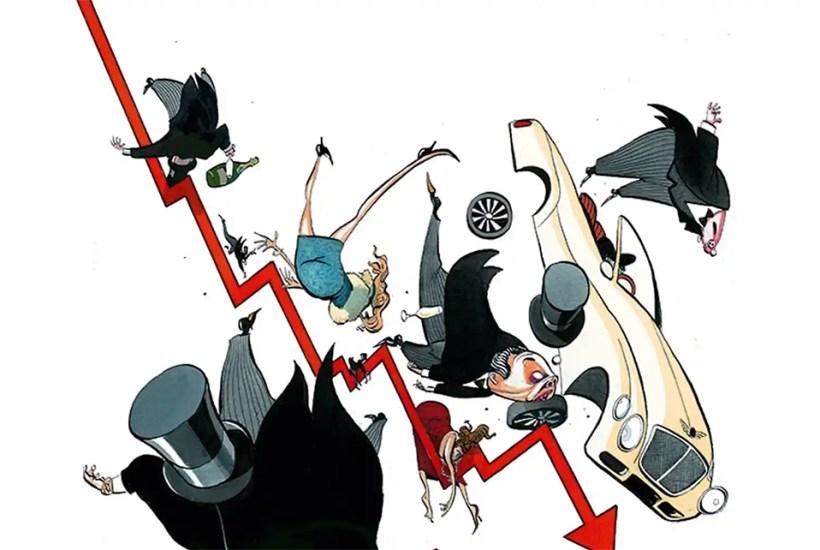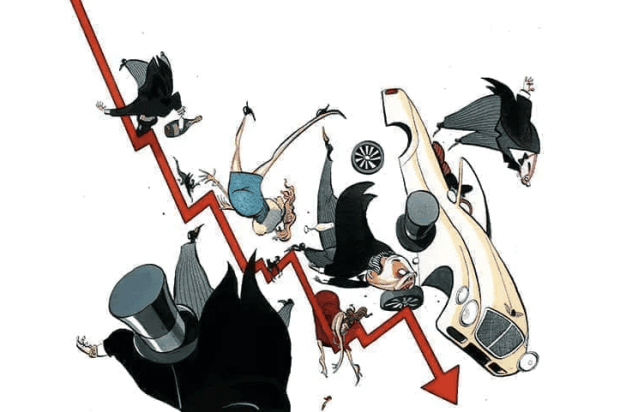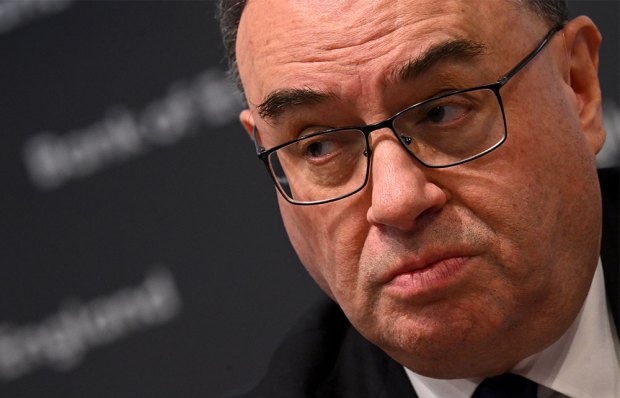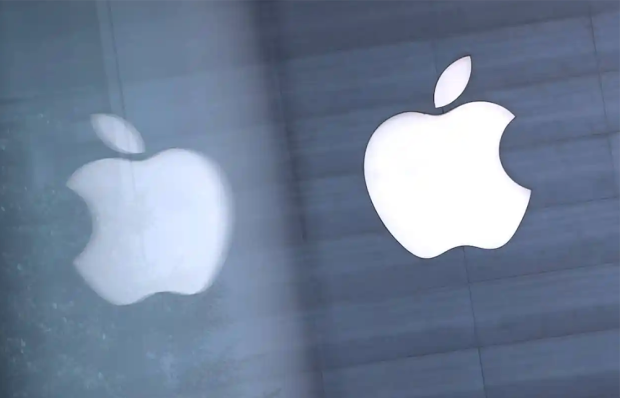A colourful selection of news items this week seem to have a central thread. Elizabeth Holmes, founder of the Theranos fake blood-test venture once valued at $9 billion, was sentenced to 11 years in prison for fraud. Sam Bankman-Fried, founder of FTX, the collapsed crypto exchange once valued at $32 billion, was holed up in the Bahamas awaiting extradition to face US justice. Despite continuing crypto mayhem, Binance – the Cayman-based rival exchange that declined to rescue FTX – announced the auction of ‘seven animated NFT statues’ celebrating the triumphs of footballer Cristiano Ronaldo.
Also still making headlines, Elon Musk appears set on destroying his $44 billion Twitter purchase – and former shareholders must think themselves lucky to have been bought out at a 38 per cent premium to the last traded price before he came over the horizon. Meanwhile, the Nasdaq-100 tech stock index is down 40 per cent from its peak, and the Cambridge-based semi-conductor designer Arm Holdings has deferred flotation for fear of not achieving the $40 billion-plus valuation sought by its Japanese owner, Softbank.
What ties this bundle together? It looks like the end – if only for the time being – of what we might call the ‘my truth’ investment boom, in which delusion, falsehood and the cult of fake genius have bloated the prices of so many fashionable but flimsy financial objects of desire. That evaporation of hype can’t be a bad thing – and now is surely a good time to revisit the merits of ‘value investing’ (picking and holding stocks, however boring, whose price is low compared with the intrinsic value of their underlying business) as practised by 92-year-old Warren Buffett, with his long-term holdings in the likes of Coca-Cola, Kraft Heinz, American Express and Chevron.
Noting another of this week’s revelations, that the Paris stock market is now worth fractionally more than London’s – both being close to $2.8 trillion, but London having been almost $2 trillion ahead before Brexit – I’m trying to think positive. Perhaps the London Stock Exchange hosts less of the overvalued froth that prefers to list elsewhere; and surely there must now be plentyof sunken ‘value’ treasures in the FTSE lists.
Our veteran investor Robin Andrews responds immediately with four suggestions: Barratt the housebuilder, Diageo the drinks giant, Smith & Nephew in medical equipment and, perhaps inevitably, Tesco. Send yours – recession-proof, inflation-resistant, solidly managed, dull as you like – to martin@spectator.co.uk.
History retold
‘Nigel Lawson’s Big Bang inspires us today,’ declared Jeremy Hunt in his Autumn Statement. Does it? The City rule changes that came into force in October 1986, allowing banks to buy Stock Exchange firms and build securities trading operations in imitation of Wall Street, would be my chosen Mastermind subject and I beg to differ with the Chancellor’s speechwriters, pointing to a chapter headed ‘Big Bang ruined the City’ in my recent book on capitalism. What I meant by that heading was that – while the ownership revolution reinforced London’s position as a global financial centre and attracted new waves of international capital – British firms largely failed to make the most of the opportunity and ended up subsumed by American and European owners in a process that my predecessor Christopher Fildes called ‘Wimbledonisation’: we provided the courts but the foreigners carried off all the trophies.
The recent death of Sir Evelyn de Rothschild, long-time steward of his family’s banking house, is a reminder that the strongest survivors of Big Bang were those who stood apart and retained their independence. And although Nigel Lawson was chancellor throughout, the political father of Big Bang is more usually identified as Cecil Parkinson during his brief tenure as trade secretary in 1983. Hunt is a sensible sort of fellow, but this casualness with history tells us he’s not a City man.
Positive step
Hunt’s Big Bang reference came alongside some elevated waffle about ‘combining our technology and science brilliance with our formidable financial services to turn Britain into the world’s next Silicon Valley’. We’ll wait to see whether an unravelling of EU rules is enough to make any of that happen. But there was one point of substance worth noting: the promised overhaul of ‘Solvency II’ regulations which force insurance and pension institutions to keep huge holdings of cash and government bonds rather than invest in long-term illiquid loans to finance infrastructure projects such as the Sizewell C nuclear plant. This was one of the issues I discussed recently with the incoming Lord Mayor, Nick Lyons, so I checked back with him for his reaction to the Chancellor’s claim to be unlocking ‘tens of billions of investment for our growth-enhancing industries’.
Excellent news in principle, says Lyons, though insurers will look for ‘good credit quality and strong cash flows’ before they commit policyholders’ money. To which we might add that they’ll also need political certainty that such projects won’t be chopped by the Treasury before they’re finished – and significantly higher returns than are offered by the traditional vault full of gilts. Still, scrapping Solvency II is a positive step.
Billions unblocked?
At last a decision – from Business Secretary Grant Shapps, who inherited the file from Kwasi Kwarteng – to block the sale, on national security grounds, of Newport Wafer Fab to a Dutch subsidiary of Wingtech Technology of Shanghai. While we ponder how we’ll ever be ‘the next Silicon Valley’ if this modest Newport venture, which would have been sold for just £63 million, is the UK’s largest microchip factory, we can at least take satisfaction from reports of anger in Beijing at the Shapps ruling. As the Sun might have trumpeted: up yours, Xi Jinping.
The post The welcome death of the ‘my truth’ investment boom appeared first on The Spectator.
Got something to add? Join the discussion and comment below.
Get 10 issues for just $10
Subscribe to The Spectator Australia today for the next 10 magazine issues, plus full online access, for just $10.
You might disagree with half of it, but you’ll enjoy reading all of it. Try your first month for free, then just $2 a week for the remainder of your first year.















Comments
Don't miss out
Join the conversation with other Spectator Australia readers. Subscribe to leave a comment.
SUBSCRIBEAlready a subscriber? Log in